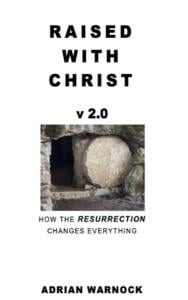
Embrace the reality of life after death. Do not imagine we will merely be a spirit or angel in heaven. Rather we will be given an eternal, tangible, physical body. This eternity far outweighs all the pain and suffering we all endure in life. We will be reunited with loved ones, and with Jesus Christ himself who has gone before us. All this transforms death and loss into great eternal gain!
For since by man came death, by man came also the
resurrection of the dead. For as in Adam all die,
even so in Christ shall all be made alive. 1 CORINTHIANS 15:21–22, KJVOur citizenship is in heaven, and from it we await a Savior,
the Lord Jesus Christ, who will transform our lowly body
to be like his glorious body, by the power that
enables him even to subject all things to himself. PHILIPPIANS 3:20–21And God raised the Lord and will also raise us up by his power. 1 CORINTHIANS 6:14
If in Christ we have hope in this life only, we are of all people most to be pitied. 1 CORINTHIANS 15:19
I once purchased some new shoes online. When the box arrived, I ripped it open. I was pleased with how they looked and mentally consigned my old pair to the trash. I immediately put the new shoes on and went to pick up my children from school. On my return from what is only a short walk, both of my heels had blisters, one of which had burst. My toes were also rather numb. I looked at the aging shoes this new purchase was designed to replace and thought, I’m sorry for despising you; you may look old, but at least you are not trying to destroy my feet!
A friend told me that the shoes were the wrong size. I knew better. Over the next few weeks I wore them, at first for quite literally just a few seconds at a time! Slowly the leather softened and stretched a little, and my shoes became comfortable. The pain had been worth it. The shoes lasted a lot longer than the agony. They became no longer enemies but friends. Without a clear expectation of the result of my pain, I would not have tolerated it.
When it comes to the pain that we all experience from time to time in this world, we often don’t have the same degree of choice. Usually we can’t control the difficulties that come our way. Jesus said, “In this world you will have trouble” (John 16:33, niv). As my mentor Henry Tyler used to love to say when preaching about this verse, “Jesus always keeps his promises.” Some people simplistically argue that we should “name and claim” God’s promises. But I have never heard anyone “claim” this one!
When our life is going well, we are just in an interlude between troubles. There is no happiness that this world can give us that can’t be taken away in an instant. Tim Keller put it this way:
No matter what precautions we take, no matter how well we have put together a good life, no matter how hard we have worked to be healthy, wealthy, comfortable with friends and family, and successful with our career — something will inevitably ruin it.[1] READ MORE
A telephone call, a visit to the doctor, a short message can suddenly bring everything crashing down around us. We must be realistic about the world we live in. Jesus never promised to remove all hardships from us. Some people even report that when they became Christians, it almost seemed as if their problems began!

This article comes from the second edition of my book, Raised With Christ has been released in Kindle, Paperback, and Hardback. You can order the book on your nearest Amazon online store wherever you are in the World. We have been able to release this new edition of the book at a very reasonable prices:
BUY THE BOOK
USA: Paperback Hardback Kindle
UK: Paperback Hardback Kindle
Christians must experience pain in this world. Paul declares, “Through many tribulations we must enter the kingdom of God” (Acts 14:22), and “all who desire to live a godly life in Christ Jesus will be persecuted” (2 Timothy 3:12). Without suffering we cannot enter the glorious resurrection Jesus has for us.
We need to understand this so we can live well and to prepare ourselves to die well. A doctor who works in a hospice told me she has seen Christian children calmly dying full of confidence in their best friend, Jesus. We can face death without fear when we understand what we will gain. Christians can be confident when facing death and need not live in denial, pretending that it’s not going to happen. Death itself is the result of sin, so it is not something we should desire. However, for the Christian, death has lost its sting (1 Corinthians 15:55). Christians have at times been almost reckless in the face of death. For example, some have traveled to the mission field despite knowing they would most likely die quickly of tropical diseases, because they were certain they had an eternal future awaiting them.
HOPE BEYOND THE GRAVE
Even in our worldly troubles we need not be dismayed. Jesus said, after promising that we would have trouble, “But take heart; I have overcome the world” (John 16:33). He has promised to be with us and to help us, and we will share in his victory. Our troubles do not evaporate in the presence of Jesus, but we can know God during them. Our problems become his to resolve. We look forward to the day when all pain will cease, and in the meantime we experience his deliverance even in this life.
After two decades of ministry Paul still expressed the tension that even mature Christians can feel during great suffering and that tempted him to lose hope. Yet he still clung to the belief that God would rescue him:
For we were so utterly burdened beyond our strength that we despaired of life itself. Indeed, we felt that we had received the sentence of death. But that was to make us rely not on ourselves but on God who raises the dead. He delivered us from such a deadly peril, and he will deliver us. On him we have set our hope that he will deliver us again.
(2 Corinthians 1:8–10)
The pain we experience in this world will not seem so severe if we understand that it is only temporary and very necessary for us. It is only through suffering, which can even feel like we are dying on the inside, that we experience the victory Jesus intends for us. Paul argued that Christians are “always carrying in the body the death of Jesus, so that the life of Jesus may also be manifested in our bodies” (2 Corinthians 4:10). Thus, through suffering we connect with the transforming resurrection power of God. God does not intend for Christians to merely feel all right under the circumstances. Since we have been raised with Christ, we are actually over our circumstances! As Paul said, “in all these things we are more than conquerors through him who loved us” (Romans 8:37).
Unless we live with an eternal perspective on the all too frequent troubles of this world, we will not be able to face them with the attitude that Paul models: “For I consider that the sufferings of this present time are not worth comparing with the glory that is to be revealed to us. For the creation waits with eager longing for the revealing of the sons of God” (Romans 8:18–19).
One of the best-loved worship songs written in recent years in the UK is partly based on this Scripture. The words, together with its heart-clenching tune, can sometimes reduce even grown men who love eating steak to tears. It is full of hope:
Christians have a hope that goes beyond the grave. It is a hope that we will be physically raised, not merely somehow survive as spirits. It is surprising how much confusion there is among Christians about the issue of life after death. We all believe that somehow, we will survive death, but there is a lot of uncertainty about what that will look like. Popular Western culture speaks about people who die and become angels, and many Christians associate “going to heaven to be with Jesus when we die” with a disembodied “spiritual” resurrection. Spurgeon believed that people in his day were also confused about this matter:
There are very few Christians who believe the resurrection of the dead. You may be surprised to hear that, but I should not wonder if I discovered that you yourself have doubts on the subject. By the resurrection of the dead is meant something very different from the immortality of the soul: that, every Christian believes, and therein is only on a level with the heathen, who believes it too. . . .
The doctrine is that this actual body in which I now exist is to live with my soul . . . The spirit, every one confesses, is eternal; but how many there are who deny that the bodies of men will actually start up from their graves at the great day! Many of you believe you will have a body in heaven, but you think it will be an airy fantastic body, instead of believing that it will be a body like to this—flesh and blood (although not the same kind of flesh, for all flesh is not the same flesh), a solid, substantial body, even such as we have here . . . If ye were Christians as ye profess to be, ye would believe that every mortal man who ever existed shall not only live by the immortality of his soul, but his body shall live again, that the very flesh in which he now walks the earth is as eternal as the soul, and shall exist for ever. That is the peculiar doctrine of Christianity. The heathens never guessed or imagined such a thing.[3]
Jesus promises us, “I am the resurrection and the life. Whoever believes in me, though he die, yet shall he live, and everyone who lives and believes in me shall never die” (John 11:25–26). Paul is full of courage and assurance that Jesus will be honored in his life, and ultimately in his death:
For none of us lives to himself, and none of us dies to himself. For if we live, we live to the Lord, and if we die, we die to the Lord. So then, whether we live or whether we die, we are the Lord’s. For to this end Christ died and lived again, that he might be Lord both of the dead and of the living (Romans 14:7–9).
Paul expresses this similarly when he says that “to live is Christ, and to die is gain” (Philippians 1:21). We already live for Christ, knowing that we have been born again (Galatians 2:20), and we walk in the newness of life that Christ has given us (Romans 6:4). So our life will continue for eternity!
Paul’s desire is only that he will honor the risen Christ Jesus. We can, like Paul, experience a glorious indifference to our sufferings when we know that they are not meaningless but lead to eternal life, which is knowing God.
IMMEDIATELY WITH JESUS
The Scripture repeatedly speaks of Christians who have died as those who have “fallen asleep.” This has led some to speak of “soul sleep” and to assume that the Christian has a period of unconsciousness between death and resurrection.
This concept is inconsistent with several Scriptures. Jesus promised the thief on the cross, “Today you will be with me in Paradise” (Luke 23:43). Paul says that when we die we are “away from the body and at home with the Lord” (2 Corinthians 5:8). Also, John says that the souls of the martyrs are in heaven (Revelation 20:4). In short, for the Christian, it is only the body that sleeps. The soul or spirit remains fully alive.
The Christian therefore experiences at death a kind of spiritual renewal, when we become fully aware of what Paul tells us is already true of us. We have already been spiritually raised with Christ, and our life is already hidden with Christ in God. What this means is that our home is already in heaven. Our spirits are already with Christ in heaven:
[God] raised us up with him and seated us with him in the heavenly places in Christ Jesus. (Ephesians 2:6)
If then you have been raised with Christ, seek the things that are above, where Christ is, seated at the right hand of God . . . your life is hidden with Christ in God. When Christ who is your life appears, then you also will appear with him in glory. (Colossians 3:1–4)
Our spiritual experiences on earth are the result of the curtain being lifted so we can catch a glimpse of what is already eternally true of us. Our souls will never be absorbed into God in some kind of mystical eastern “oneness” with the divinity. We remain distinct, aware beings, but in heaven we still await our eternal destiny of a physical resurrection. When we die we only become aware of what is already true of us. When we were born again we entered into this eternal life (see John 3). However, this new birth is just the foretaste of what is to come. Piper explains:
So when you think of your new birth, think of it as the first installment of what is coming. Your body and the whole world will one day take part in this regeneration. God’s final purpose is not spiritually renewed souls inhabiting decrepit bodies in a disease- and disaster-ravaged world. His purpose is a renewed world with renewed bodies and renewed souls that take all our renewed senses and make them a means of enjoying and praising God.[4]
A BODY MADE NEW
It is vital for us to be very clear about the fate of our bodies. It is not enough that our spirits survive this world. Ladd claimed, “Paul never conceives of the salvation of the soul apart from the body.”[5] Paul tells us, “If the Spirit of him who raised Jesus from the dead dwells in you, he who raised Christ Jesus from the dead will also give life to your mortal bodies” (Romans 8:11). We will not simply discard our physical bodies.
Paul also said, “It is my eager expectation and hope that I will not be at all ashamed, but that with full courage now as always Christ will be honored in my body, whether by life or by death” (Philippians 1:20). He says that Christ will always be glorified through his body. This really does mean our own physical bodies will survive death. As Jesus promises, “Some of you they will put to death. . . . But not a hair of your head will perish” (Luke 21:16–18).
Our resurrection is intimately connected with that of Jesus: “But in fact Christ has been raised from the dead, the firstfruits of those who have fallen asleep” (1 Corinthians 15:20), and “he who raised the Lord Jesus will raise us also with Jesus and bring us with you into his presence” (2 Corinthians 4:14).
The very same bodies that are placed in our tombs will one day rise again. There is continuity between our resurrection bodies and our current ones. We will, however, be changed from being weak, frail, and mortal into being glorious and eternal. It is like a seed placed in the ground that emerges in some ways the same but is in other ways different (1 Corinthians 15:37–44). Our bodies will be “spiritual” in that they are suitable for heaven, but nonetheless they will still be physical bodies of flesh, as there are different kinds of flesh. Paul makes this even clearer elsewhere:
For we know that if the tent that is our earthly home is destroyed, we have a building from God, a house not made with hands, eternal in the heavens. For in this tent we groan, longing to put on our heavenly dwelling, if indeed by putting it on we may not be found naked. For while we are still in this tent, we groan, being burdened—not that we would be unclothed, but that we would be further clothed, so that what is mortal may be swallowed up by life. He who has prepared us for this very thing is God, who has given us the Spirit as a guarantee. (2 Corinthians 5:1–5)
Paul argues in 1 Corinthians 15 that the resurrection of the believer is a direct consequence of the resurrection of Jesus. Because he was raised, we can be certain that we too will be raised. He is the firstfruit of the new creation.
We will be like Jesus. “But our citizenship is in heaven, and from it we await a Savior, the Lord Jesus Christ, who will transform our lowly body to be like his glorious body, by the power that enables him even to subject all things to himself” (Philippians 3:20–21).
Since our bodies are to be just like Christ’s, then we too will be able to eat and drink, yet pass through walls, and fly into the clouds to meet him (1 Thessalonians 4:17). We will be recognizable, although no longer ugly but the attractive unique individuals God intended us to be. That beauty will certainly not look like our modern distorted images (such as the size zero model) that fashion tries to foist on us. Our bodies will no longer be aged and worn-out. I suppose we will look as though we were a perfect age—some suggest perhaps thirty-three, the age we believe Jesus was when he was crucified.
Some worry about what will happen to bodies lost at sea or burned. God can reassemble the molecules or perhaps simply the structure of our bodies. The actual molecules in our bodies are being replaced all the time; it is how they all relate together to form a structure that defines us. God promised us that not even a single hair of these physical bodies of ours will ultimately perish.
I suppose a close modern illustration of what may occur is the fictional transporter of Star Trek. Do the actual molecules of Captain Kirk get moved from the surface to the ship, or is the energy signature used to re-create his body in a new location? Does it matter? Not really. The key point for us is that God is more than capable of gathering our dust from the four corners of the earth and reassembling it if necessary.
We will be real people with real bodies and real relationships. We will worship our God, but we will also have real reunions with each other. Marriages will be dissolved but we will all still recognize each other. The joy of worshipping our glorious God will only be intensified by our delight in meeting his wonderful creatures. Such thoughts are worthy of meditation. Paul says:
But we do not want you to be uninformed, brothers, about those who are asleep, that you may not grieve as others do who have no hope. For since we believe that Jesus died and rose again, even so, through Jesus, God will bring with him those who have fallen asleep. For this we declare to you by a word from the Lord, that we who are alive, who are left until the coming of the Lord, will not precede those who have fallen asleep. For the Lord himself will descend from heaven with a cry of command, with the voice of an archangel, and with the sound of the trumpet of God. And the dead in Christ will rise first. Then we who are alive, who are left, will be caught up together with them in the clouds to meet the Lord in the air, and so we will always be with the Lord. Therefore encourage one another with these words. (1 Thessalonians 4:13–18)
READ MORE
We grieve, but not in the same way as those who have no hope
References
[1] Tim Keller, Walking with God Through Pain and Suffering, cited in https://www.patheos.com/blogs/adrianwarnock/2019/09/hope-in-suffering/
[2] “There Is a Day” by Nathan Fellingham is available on the Phatfish album 15, which can be purchased at http://phatfish.net. Copyright © 2001 Thankyou Music (PRS) adm. worldwide by EMI CMG Publishing, excluding Europe which is adm. by Kingswaysongs.com. All rights reserved. Used with permission.
[3] C. H. Spurgeon, Sermon No. 66, “The Resurrection of the Dead,” delivered on Sabbath Morning, February 17, 1856, at New Park Street Chapel, Southwark; http://www.spurgeon.org/sermons/0066.htm.
[4] John Piper, Finally Alive (Rossshire: Christian Focus, 2009), 89.
[5] George Eldon Ladd, I Believe in the Resurrection of Jesus (London: Hodder and Stoughton, 1975), 45.














